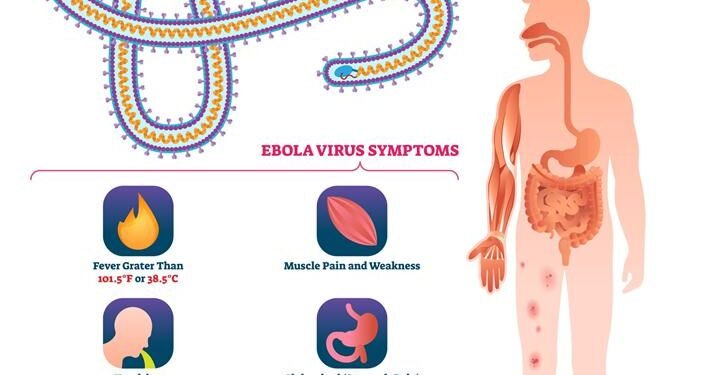The South Sudan Ministry of Health has issued an alert to the public following a new outbreak of the Ebola virus disease (EVD) in the neighboring Democratic Republic of Congo (DRC).
The outbreak was officially declared on September 4, 2025, in the Kasai Province after the Zaire strain of the virus was confirmed in a patient’s specimen.
In its circular issued on Friday, the health ministry noted that this marks the 16th EVD outbreak in the DRC since the virus was first identified in 1976. The outbreak’s index case was a 34-year-old woman who died on August 25, 2025.
According to the Ministry’s circular seen by the Nile Witness as of September 4, there have been a total of 28 suspected cases and 13 deaths, including four healthcare workers, with a case fatality rate estimated at 53.6%.
It further noted that the cases have been reported in the Bulapeand Mweka health zones within Kasai province, an area described as remote and challenging to access.
Ebola is a severe, often fatal, illness transmitted through direct contact with blood, bodily fluids, or tissues of an infected person or contaminated surfaces. The symptoms include fever, fatigue, muscle pain, headache, vomiting, diarrhea, and unexplained bleeding.
Health authorities emphasized that the Zaire strain is particularly dangerous, with a case fatality rate that can be as high as 90% if left untreated.
The Ministry of Health however reassured the public that it is committed to transparent communication and is stepping up measures with the World Health Organization (WHO) and other partners to ensure South Sudan is prepared to respond to any potential spread.
Meanwhile, the ministry is urging all citizens to remain vigilant and report any suspected cases of fever, vomiting, diarrhea, or unusual bleeding to the nearest health facility or by calling the toll-free line 6666.
The circular also provided key preventive measures including:Avoiding physical contact with individuals showing symptoms, practicing strict hand hygiene by washing hands with soap and water or using alcohol-based hand sanitizers.
Other measure are: Avoiding direct contact with bodily fluids of suspected Ebola patient and do not handle the bodies of individuals who have died from Ebola-like symptoms.
The Ministry strongly advised that all burials must be supervised by designated health teams.
Additionally Community engagement and awareness campaigns through various channels, including religious and community leaders, are being prioritized to help in the collective effort to prevent the spread of the disease.












